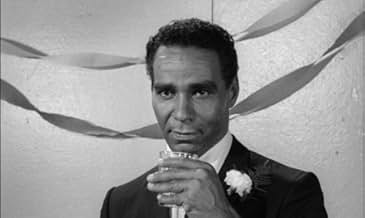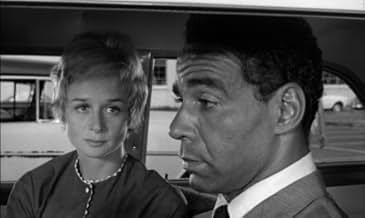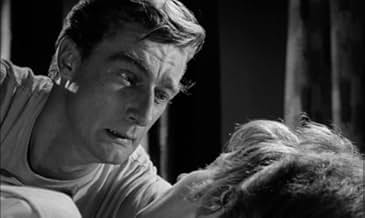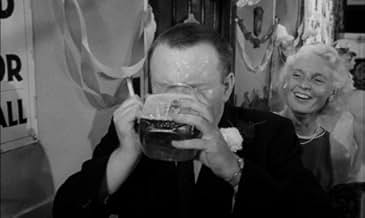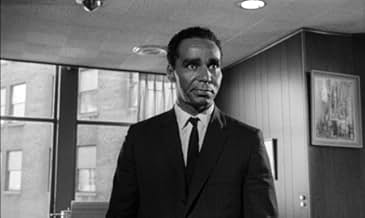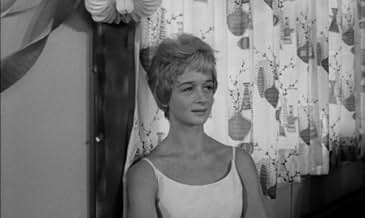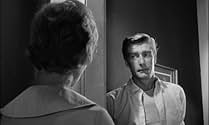PUNTUACIÓN EN IMDb
7,2/10
980
TU PUNTUACIÓN
Estudio del matrimonio interracial en la década de 1960.Estudio del matrimonio interracial en la década de 1960.Estudio del matrimonio interracial en la década de 1960.
- Dirección
- Guión
- Reparto principal
- Nominado para 1 premio Óscar
- 2 premios y 4 nominaciones en total
Martha L. Mericka
- Ellen Mary
- (as Marti Mericka)
Vinnette Carroll
- Martha Richards
- (as Vinette Carroll)
Anthony Spinelli
- Johnny Hruska
- (as Sam Weston)
Kenny Bass
- Orchestra Leader
- (sin acreditar)
Joel Ehrlich
- Bart
- (sin acreditar)
Dick Flaisman
- Saxophone Player
- (sin acreditar)
Doris Helsel
- Minister's Wife
- (sin acreditar)
Paul S. Orgill
- Lawyer
- (sin acreditar)
Bea Pestotnik
- Wedding Guest
- (sin acreditar)
John Pestotnik
- Wedding Guest
- (sin acreditar)
Reseñas destacadas
"One Potato, Two Potato" is a very low budget production that made a bit of commotion back when it debuted in 1964. Despite its lowly pedigree (it was filmed in the Cleveland area and the actors were mostly unknowns at the time), the lead actress (Barbara Barrie) received the Best Actress award at Cannes and the film was nominated for an Oscar (Best Writing, Story and Screenplay - Written Directly for the Screen). Sadly today, it's a pretty obscure picture.
Julie (Barrie) is a divorced mother of a young girl. The father abandoned them years ago and Julie works at the company where Frank (Bernie Hamilton) works. The meet and through the course of spending time together, they find that there is an attraction. Eventually, they decide to get married--even though they realize it might cause a few heads to turn. After all, she is white and he is black. Despite a bumpy start, things work out and the young family prospers and grows. Things look pretty good, right? Well, they do until the child's biological father shows up unexpectedly. Now the man (?) wants his daughter--mostly because his ego cannot stand that his ex- is with a black man.
This is a well made film but I must warn you that it will rip your heart out. This is NOT a complaint. Heck, back in 'the good old days', it was STILL illegal for blacks and whites to marry in many southern states and in others it was quite possible to lose custody of a child simply because you married someone of another race. Crazy...and pretty stupid. So, it's great that the movie draws attention to it. My only complaint is that the film, while very interesting, is way underplayed--too underplayed. Some more emotion in the acting and relationship between Frank and Julie would have made the movie better overall.
Julie (Barrie) is a divorced mother of a young girl. The father abandoned them years ago and Julie works at the company where Frank (Bernie Hamilton) works. The meet and through the course of spending time together, they find that there is an attraction. Eventually, they decide to get married--even though they realize it might cause a few heads to turn. After all, she is white and he is black. Despite a bumpy start, things work out and the young family prospers and grows. Things look pretty good, right? Well, they do until the child's biological father shows up unexpectedly. Now the man (?) wants his daughter--mostly because his ego cannot stand that his ex- is with a black man.
This is a well made film but I must warn you that it will rip your heart out. This is NOT a complaint. Heck, back in 'the good old days', it was STILL illegal for blacks and whites to marry in many southern states and in others it was quite possible to lose custody of a child simply because you married someone of another race. Crazy...and pretty stupid. So, it's great that the movie draws attention to it. My only complaint is that the film, while very interesting, is way underplayed--too underplayed. Some more emotion in the acting and relationship between Frank and Julie would have made the movie better overall.
Three years before "guess who's coming to dine?" , Larry Peerce broached a taboo subject in a more convincing way ,at least in my book : no big star ,no brilliant fiance with a Nobel Prize in sight, no wide screen and no color, a shoestring budget .
Both heroes,when the movie begins (it's a long flashback) , have begun a fight which is lost in advance;the husband's lawyer , a friend though , reluctantly accepts to defend him. Religion lends a helping hand,in a the shape of a wise minister ,but the others do not (look at the face of the woman who attends the ceremony ;even the husband 's father urges his son to stick to his own kind ;it takes the birth of a baby boy to win him over).
If the final scene does not make you cry,nothing will.
Both heroes,when the movie begins (it's a long flashback) , have begun a fight which is lost in advance;the husband's lawyer , a friend though , reluctantly accepts to defend him. Religion lends a helping hand,in a the shape of a wise minister ,but the others do not (look at the face of the woman who attends the ceremony ;even the husband 's father urges his son to stick to his own kind ;it takes the birth of a baby boy to win him over).
If the final scene does not make you cry,nothing will.
This film is simply shot and compellingly told. Its stars Barbara Barrie before she became a star and features an excellent cast including a performance by a child that is so touching. I saw it as a kid with my mother and was very moved by it. I count it as one of my favorite films. I haven't seen it in years and am curious to see if I would still find it as moving. As another reviewer on this site stated, the ending is gut wrenching and I concur. I would love to buy it and show it to a film class I teach but sadly it is not available. It is one of those black and white American Kammerspiel films of the 1960s (along with A Thousand Clowns, Ladybug, Ladybug, David and Lisa) that were well received at the time of their release but are now forgotten). I don't know how one goes about getting distributors to transfer these films to DVD and make them available but if anyone knows please push for this film.
This is a story about a black and white couple who fell in love despite their efforts not to cross the color line. I saw the movie in a neighborhood Atlanta cinema and became worried about the audience's reaction both during the movie and as the people left. It was a daring subject to be presented in an angry location at a smoldering year. The audience was absolutely mute ... except for one guy that made an unwise crack to his date as we were leaving. She turned on him, tears in her eyes.
This movie should be on VHS or DVD but I wouldn't be surprised if it's lost.
This movie should be on VHS or DVD but I wouldn't be surprised if it's lost.
10crsytt
I saw this movie in the mid-60s in a theater and the last scene was heart-wrenching. I felt like I had been hit by a baseball bat. Several years later I saw the movie on TV and was surprised to find that, as that final scene approached, I could feel the same emotions building. The movie had not lost its effect! I would love to watch this movie again to see if it would have the same impact. It would be interesting if young people today would see the power of this film or if, because "things have changed," the story line would seem outdated. Apparently this film is NOT available on video, unfortunately. I wonder why? Who makes that decision?
¿Sabías que...?
- CuriosidadesIntermarriage between African-Americans and Caucasians was illegal in 16 states until the US Supreme Court decision Loving v. Virginia was handed down on June 12, 1967. The court unanimously ruled that anti-miscegenation marriage laws were unconstitutional. In his opinion, Chief Justice Earl Warren wrote, "The freedom to marry has long been recognized as one of the vital personal rights essential to the orderly pursuit of happiness by free men. Marriage is one of the 'basic civil rights of man, fundamental to our very existence and survival. To deny this fundamental freedom on so unsupportable a basis as the racial classifications embodied in these statutes, classifications so directly subversive of the principle of equality at the heart of the Fourteenth Amendment, is surely to deprive all the State's citizens of liberty without due process of law. The Fourteenth Amendment requires that the freedom of choice to marry not be restricted by invidious racial discriminations. Under our Constitution, the freedom to marry, or not marry, a person of another race resides with the individual and cannot be infringed by the State." Interestingly, many anti-miscegenation marriage laws were enacted in the wake of African-American heavyweight champion Jack Johnson's marriages to two Caucasian women, as pointed out in Ken Burns' documentary Unforgivable Blackness: The Rise and Fall of Jack Johnson (2004). Johnson married his white mistress Etta Duryea in late 1910 or early 1911, then married another white woman, Lucille Cameron, soon after his first wife's September 1911 suicide. The two marriages outraged white America, and Johnson and Cameron fled America for Canada and then Europe under threat of lynching. Their relationship was fictionalized in the stage play, and subsequent movie, La gran esperanza blanca (1970), for which the Caucasian playwright Howard Sackler won the Pulitzer Prize. The 1913 Massachusetts anti-miscegenation marriage law, which did not recognize any marriage made in a state forbidding the marriage of different classifications of people (the law left unspoken the racial issue of black and white; in Virginia, blacks were allowed to marry other, non-white "races"), was considered inoperative after Loving v. Virginia until in 2005, then-governor Mitt Romney used it as the basis to deny out-of-state couples the right to wed in the Commonwealth of Massachusetts after the Bay State's Supreme Court legalized gay marriage.
- Citas
Jordan Hollis: What do I have to kid you for. I could get a black eye out of a case like this. What the Hell did you have to come to me for? Why do you have to do this to your friend?
- ConexionesFeatured in ¿¡Soy lo bastante negro para ti!? (2022)
Selecciones populares
Inicia sesión para calificar y añadir a tu lista para recibir recomendaciones personalizadas
- How long is One Potato, Two Potato?Con tecnología de Alexa
Detalles
- Fecha de lanzamiento
- País de origen
- Idioma
- Títulos en diferentes países
- One Potato, Two Potato
- Localizaciones del rodaje
- Painesville, Ohio, Estados Unidos(".............where this picture was shot in its entirety, our thanks.")
- Empresa productora
- Ver más compañías en los créditos en IMDbPro
Taquilla
- Presupuesto
- 340.000 US$ (estimación)
- Duración1 hora 23 minutos
- Color
- Mezcla de sonido
- Relación de aspecto
- 1.37 : 1
Contribuir a esta página
Sugerir un cambio o añadir el contenido que falta

Principal laguna de datos
What is the English language plot outline for Víctima de la ley (1964)?
Responde
